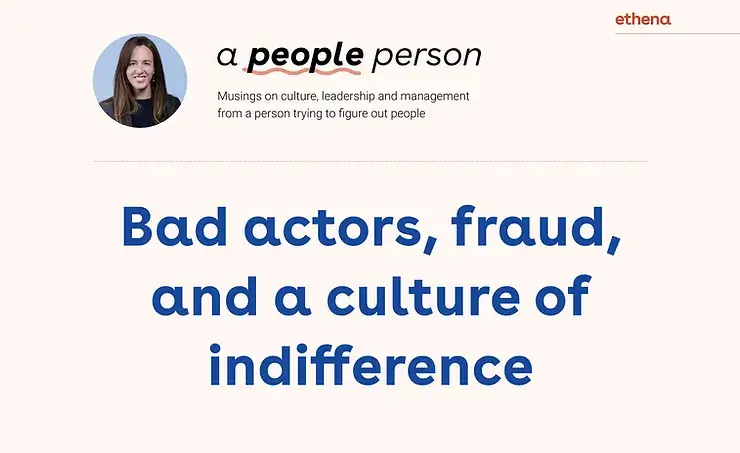Hi there,
It’s Thanksgiving season, so you might be thinking this’ll be the newsletter version of pumpkin spice and cozy blankets. But actually, I’m thinking about fraud, compliance, culture, and bad actors. Sorry.
If you have a phone you know why this is on my mind – ostensibly it’s the news that the FTX Cryptocurrency Exchange, which was worth many billions of dollars a few weeks ago, is now a gaping hole. Now, I don’t understand the details and obviously there are many details emerging, so what follows is my personal take, and not, say, a forensic accounting analysis. I was talking about this with a friend and said something like, “Yeah, the founder seems like he’ll be investigated.” My friend had the correct amount of outrage to this statement:
Seems like?! You can evaporate billions of dollars and “maybe” face consequences. If I steal deodorant from a CVS, I will definitely face consequences!
This was a helpful take that I needed to hear because, indeed, it is bonkers. But also, it’s kind of sad. Business leaders have a lot of power in society. They set agendas, push us forward, and create enduring value.
For example, I recently watched the first few minutes of The Lion King with my son (before he got bored because he only likes the monkeys). I got all misty-eyed thinking about what an incredible company Disney is – I got joy out of something 20+ years ago that my son now gets joy out of. Business: it can be good! Not flawless, but good!
But a lot of recent news coming out of tech doesn’t feel good. There are so many ways to look at this very large issue, trend, whatever – but I’m going to focus on two things: 1) what gets rewarded and 2) what we can do to make companies good, or at least not bad.
IN GOOD COMPANY
What gets rewarded
To make money disappear, you first have to have money. In tech, that money tends to come from venture capitalists. I’ve written a few times about my personal experiences with raising venture capital as a woman (including an investor who asked me if I were pregnant). Boo.
As I doomscrolled the news recently, I came across this TechCrunch article on venture capital and FTX. The gist of the article is that a certain type of founder gets rewarded with money by venture capitalists who don’t want to miss out on the next big thing.
Who will start the next big thing? “Well, we’re never sure what it is, but it’s definitely going to be started by a white dude who went to one of four colleges, so let us back him,” goes the argument.
There’s a lot in this article, and while I don’t agree with all of it, numbers don’t lie. This one hit me in the face:
In Q3, Black founders raised a measly $187 million. To put that into perspective, disgraced WeWork founder Adam Neumann picked up $350 million just from a16z for an idea that hasn’t even launched yet.
Now you might be thinking, “This is all bad, but I don’t have $187 million to invest so I’m not sure what I can do about it."
But there are things at the margins you can do to push for equity in investing, whether it’s for small businesses, startups, whatever.
Here’s a super simple question: “What percentage of [insert relevant thing you have some control over, whether it’s money invested, contracts we award, vendors we work with, employees we have] went to people of color? What percentage went to women?”
Knowledge is power, meaning that in order to address a big discrepancy, we first need data that shows that discrepancy. Honestly, this is one of many reasons why pay transparency is helpful – it gets all the information into the light where we can actually see it, and then, ideally, take action.
What we can do to make companies good, or at least not bad
This one is actually really simple. If you are in power, surround yourself with people who are willing to speak up, are empowered, and know how. If you’re a manager, make explicit space for your direct reports to tell you when you messed up (here’s a template of what we use). If you aren’t in power, practice speaking up.
So now you’ve created a culture that welcomes feedback. Then, when someone does speak truth to power, you have to reward them. Here’s how I do it. When someone at Ethena gives me a piece of hard feedback, I try to:
- Pause
- Start by saying, “Thank you for being willing to say this”
- Then, I give myself some time to think about whether I agree with what they said. I’ll say something like, “I need to think on this, but I’ll come back to you at [insert next meeting] with my thoughts.”
You might think that this is some woo-woo stuff that doesn’t have to do with fraud, but it does! Harvard Business School professor Eugene F. Soltes researches corporate misconduct, and he uses this really effective analogy:
When you’re driving on the highway, you might speed up to pass some cars and glance down at the speedometer, and see that you’re going 75 miles per hour – 10 miles over the speed limit.
You probably won’t take your foot off the accelerator unless your spouse reminds you you’re speeding, you pass an accident, or a police car is parked on the side of the road up ahead. It takes some kind of uncomfortable dissonance – an external influence or event that conflicts with your intuition – to motivate a behavioral change.
Executives need to be surrounded by people of diverse backgrounds and viewpoints. “When we’re surrounded by people that have the same views and opinions, we’re less likely to actually have that dissonance,” he says. “And therefore, we’re going to comfortably proceed without really taking a step back.”
So really, my first and second point are related – diverse and empowered teams provide a check on power that is inevitably needed. Perhaps you are, unchecked, a pedal to the medal kind of driver. But if you have a Nervous Nelly sitting next to you, and they aren’t terrified of you, they’ll remind you to slow it down. That simple reminder works wonders. Plus, “farming for dissent,” meaning actively soliciting disagreement from others (it’s a Netflix culture phrase), sharpens your own thought process. It’s like asking friends if you should get bangs. Homogenous teams, teams that tend to get more funding and resources, are more likely to be the chorus of “chug chug chug!” when the CEO takes out the keg. Diverse and empowered teams are more likely to have someone who says, “hey, maybe we should call it a night.”
So with that, I hope you all can sip some sort of autumnal beverage (mine is Nyquil because I’ve been sick for a month…) and be thankful for whomever helps you to be a better person.
What I'm listening to:
Nothing for the brain this week since I’m off with my family! I am listening to Frozen on repeat, because of my son, but I hope you’re spared.
Until next time,
Roxanne Petraeus CEO & Co-founder, Ethena









